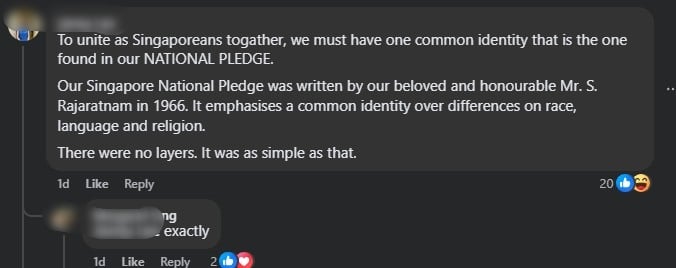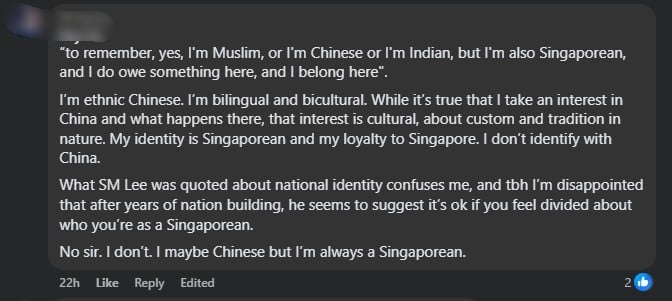SINGAPORE: While Singapore’s national identity has grown stronger as generations of citizens endured crises together, it may not always be the primary or most important identity for everyone, said Senior Minister Lee Hsien Loong on 9 September 2025.
Speaking at the Kent Ridge Ministerial Forum 2025 organised by the National University of Singapore (NUS), SM Lee noted that other aspects of people’s lives — such as race, religion, language, political views, or sexual orientation — also strongly influence how individuals see themselves.
“For many people, being Singaporean is important, but it may not be the most important part of your identity, and we have to accept that’s the way people are,” he said.
The forum, moderated by NUS Associate Professor Leong Ching, drew about 800 students and academic staff from Singapore’s autonomous universities and pre-tertiary institutions.
The central theme: what it means to be Singaporean today.
Survey findings: religion rising in importance
Lee referred to a recent Institute of Policy Studies (IPS) survey which showed that while nationality remains the most important identity marker for most Singaporeans, religion is becoming increasingly significant for a growing share of the population.
“I think I can say that the national identity is stronger but at the same time, it is not the only tribe which we belong to, because we all have different layers to our identity,” he said.
Language, he added, plays a deep role, especially for older generations, while political leanings or sexual orientation can shape the communities people belong to and the way they interpret the world.
Guarding against social fault lines
Acknowledging these varied dimensions of identity, SM Lee stressed the importance of recognising differences without letting them become fault lines.
“So, these are all other aspects that we must know — that we are one people but we are not all identical, and there are fault lines which we have to guard,” he said.
When asked whether globalisation or domestic divisions posed a bigger challenge to national cohesion, Lee responded that both matter, but global forces often have outsized influence.
Globalisation and external pressures
He warned that external developments could pull Singapore in multiple directions, especially given its openness to trade, migration, and cultural exchange.
“Our job is to resist that and to remember: ‘Yes, I am Muslim, or I’m Chinese, or I’m Indian, but I’m also Singaporean,” he said.
“And I do hold something here, I belong here, and I should look at the world, starting from here.”
National identity as a choice and conviction
Lee emphasised that being Singaporean has never been about ancestry alone.
He cited the words of S Rajaratnam, Singapore’s first Foreign Minister, who described national identity as “a matter of conviction and choice.”
For the pioneer generation, he recalled, the choice was whether to stand up and build a country together, or resign themselves to fate.
“For that generation, the choice was to stand, fight, and build,” he said.
Today, younger Singaporeans face a different but equally important choice: whether to carry on the mission of improving Singapore for the next generation, or to pursue opportunities abroad.
“I think for this generation too, it has to be choice and conviction. If you just so happen to be here and tomorrow the wind blows ‘poof’ and … tomorrow you won’t be here, and Singapore won’t be here,” he said.
Shared roots, family, and contributions
Lee underlined that being Singaporean means sharing roots, bonds, and responsibilities within the nation.
“There has to be something which we hold in common together. We have grown up here. Our friends are here. Our family is here. We have made contributions here. We hope to do things here. This place is our home, and this place has its own interests.”
Recalling a 1975 exchange between S Rajaratnam and Chinese leaders, Lee explained how Singapore had always insisted on being an independent, multiracial state, despite its ethnic Chinese majority.
Foreign counterparts, especially in China, sometimes assume Singapore’s positions will align with theirs due to cultural similarity.
But Singapore, he stressed, must act based on its own interests as a sovereign nation.
Preserving the past, reforming the future
During the dialogue, a student asked which aspects of Singapore’s past should be preserved and which should evolve.
Lee replied that identity has been shaped through the country’s deliberate efforts to live together harmoniously, accommodate differences, and compromise across racial and religious divides.
This collective adjustment, he said, is what makes Singaporeans recognisable even abroad.
He rejected the notion of adopting the French model of “erasing” racial and religious categories, calling it impractical for Singapore.
Instead, acknowledging diversity openly ensures that problems are addressed rather than ignored.
Identity through adjustment and compromise
An Indonesian student asked which core value of the Singaporean identity foreigners living here should embrace and carry with them wherever they go.
Lee first reflected on today’s competitive landscape, noting that while opportunities are broader and lifestyles more flexible, competition is fiercer — citing examples such as China’s “996” work culture and neijuan (involution).
He urged young Singaporeans not to be deterred, but instead to seize the wider range of opportunities available compared to earlier generations.
Central to Singaporean identity, he argued, is the habit of compromise and accommodation — the ability to live alongside different communities without insisting on uniformity.
“I think these are adjustments which have helped Singaporeans to become what they are and made us more strongly Singaporean,” he said.
Respecting differences in policy design
Lee pointed out that national policies often reflect this ethos of balancing unity with diversity.
He gave the example of allowing citizens to display names on their National Registration Identity Cards (NRIC) in their original scripts — whether Chinese, Tamil, or Jawi.
“It’s an acknowledgment that I can’t force you into one mold and I don’t want to force you into one mold,” he said.
Lee said Singapore may not be perfect, but what defines it is the constant drive to improve and not rest on its achievements.
That spirit of never being complacent, he added, is a value foreigners should learn when they join Singaporean society.
Online debate underscores calls for a ‘Singaporean-first’ identity
Following SM Lee’s remarks, discussions on state media platforms like CNA and The Straits Times drew wide-ranging reactions from Singaporeans online.
Some netizens stressed that unity must be grounded in the National Pledge — written by Rajaratnam — which explicitly calls for a shared identity above race, language, and religion.

Others were more critical, questioning whether the government’s position was being softened to accommodate the influx of new citizens who may not share the same emotional ties to Singapore.

Several commenters expressed worry that government policies continue to reinforce racial categories instead of promoting a “Singaporean-first” identity. This, they argued, weakens the sense of belonging.
There was also concern that younger generations may not feel as deeply attached to Singapore, with many openly considering opportunities overseas.

Yet, amidst the debate, some Singaporeans affirmed their loyalty.
Ethnic Chinese netizens, for instance, said that while they valued their cultural heritage, their primary identity and loyalty remain to Singapore.
The responses highlighted the complexity of national identity in a diverse society, where multiple allegiances coexist but a common core must still hold.


The post Lee Hsien Loong says Singapore must accept national identity may not be top priority for all citizens appeared first on The Online Citizen.


